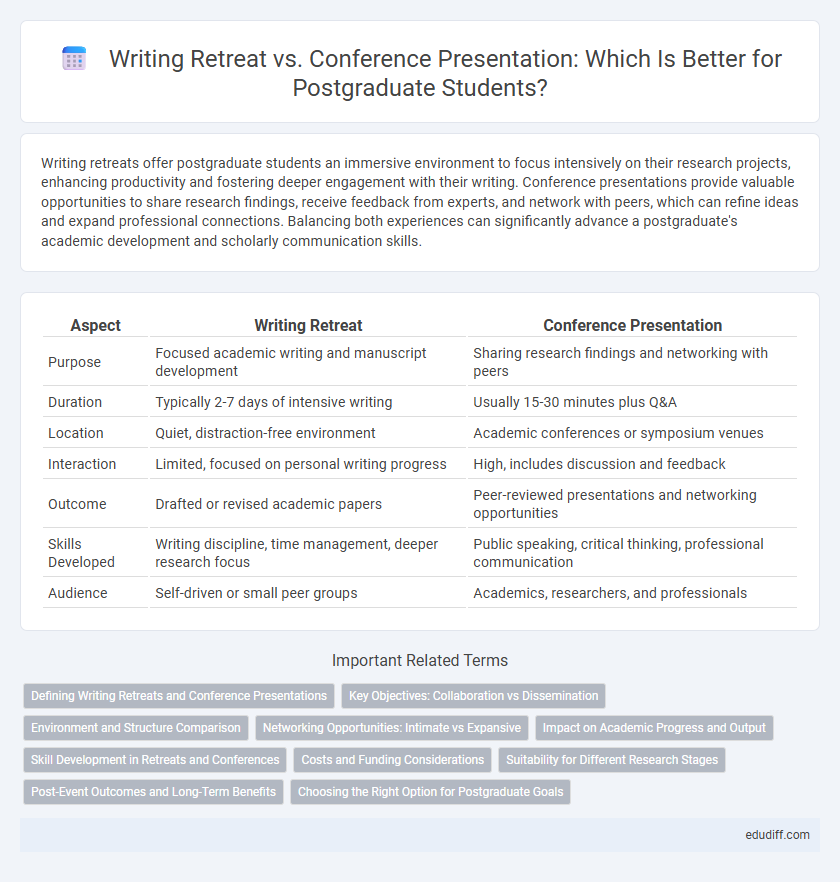Writing retreats offer postgraduate students an immersive environment to focus intensively on their research projects, enhancing productivity and fostering deeper engagement with their writing. Conference presentations provide valuable opportunities to share research findings, receive feedback from experts, and network with peers, which can refine ideas and expand professional connections. Balancing both experiences can significantly advance a postgraduate's academic development and scholarly communication skills.
Table of Comparison
| Aspect | Writing Retreat | Conference Presentation |
|---|---|---|
| Purpose | Focused academic writing and manuscript development | Sharing research findings and networking with peers |
| Duration | Typically 2-7 days of intensive writing | Usually 15-30 minutes plus Q&A |
| Location | Quiet, distraction-free environment | Academic conferences or symposium venues |
| Interaction | Limited, focused on personal writing progress | High, includes discussion and feedback |
| Outcome | Drafted or revised academic papers | Peer-reviewed presentations and networking opportunities |
| Skills Developed | Writing discipline, time management, deeper research focus | Public speaking, critical thinking, professional communication |
| Audience | Self-driven or small peer groups | Academics, researchers, and professionals |
Defining Writing Retreats and Conference Presentations
Writing retreats provide postgraduate students with dedicated, distraction-free environments to focus intensively on producing academic work, fostering peer support and mentorship. Conference presentations involve sharing research findings with scholarly communities, enabling feedback, networking, and professional development. Both activities enhance postgraduate academic progress but serve distinct purposes in research dissemination and skill-building.
Key Objectives: Collaboration vs Dissemination
Writing retreats emphasize deep collaboration among postgraduate researchers, fostering intensive peer feedback and collective problem-solving to enhance the quality of academic writing. Conference presentations primarily focus on the dissemination of research findings to a broader audience, promoting scholarly visibility and professional networking. Balancing collaboration during retreats with dissemination at conferences optimizes research development and academic impact.
Environment and Structure Comparison
Writing retreats offer a focused, distraction-free environment designed to enhance deep work through a structured timetable and quiet spaces, fostering individual creativity and productivity. Conference presentations, set in dynamic and often crowded venues, prioritize interactive knowledge exchange and networking within a fixed schedule of sessions. The controlled atmosphere of retreats contrasts with the energetic, social structure of conferences, each catering to different postgraduate goals in research dissemination and development.
Networking Opportunities: Intimate vs Expansive
Writing retreats offer intimate networking opportunities with a small, focused group of postgraduate peers and mentors, fostering deep, meaningful academic relationships and personalized feedback. Conference presentations provide expansive networking platforms, connecting attendees with a diverse array of scholars, industry professionals, and potential collaborators across various fields. Both formats enhance postgraduate experiences but cater to different networking goals: writing retreats emphasize quality and depth, while conferences prioritize broad exposure and professional visibility.
Impact on Academic Progress and Output
Writing retreats provide postgraduate students with dedicated, distraction-free time to develop research manuscripts, significantly enhancing the quality and quantity of academic output. Conference presentations offer opportunities for real-time feedback and networking, which can refine ongoing research and foster collaborations that accelerate academic progress. Combining both experiences optimizes scholarly productivity by balancing focused writing with interactive dissemination.
Skill Development in Retreats and Conferences
Writing retreats foster deep skill development through immersive, focused writing sessions and personalized feedback, enhancing academic writing, critical thinking, and time management abilities. Conference presentations develop skills in public speaking, networking, and concise communication by engaging diverse audiences and field experts. Both experiences complement postgraduate growth by addressing distinct competencies critical for scholarly success and professional visibility.
Costs and Funding Considerations
Writing retreats often require funding for travel, accommodation, and registration fees, which can add up significantly but may offer more focused time to produce substantial research output. Conference presentations typically involve costs for travel, conference fees, and sometimes poster printing, but they provide opportunities for networking and professional exposure that can justify budget allocation. Postgraduate students should carefully evaluate available grants, scholarships, and departmental support to balance these expenses against the academic and career benefits of each option.
Suitability for Different Research Stages
Writing retreats offer postgraduate researchers intensive, distraction-free time ideal for early-stage manuscript development and data analysis, fostering deep focus and productivity. Conference presentations suit later stages when preliminary findings are ready to be shared for feedback, networking, and academic discourse. Both formats complement postgraduate research progression by aligning with distinct needs of drafting and dissemination phases.
Post-Event Outcomes and Long-Term Benefits
Writing retreats foster sustained productivity and deep focus, often resulting in substantial manuscript drafts or grant proposals, which enhance long-term research output and academic development. Conference presentations generate immediate scholarly feedback and networking opportunities, promoting visibility and potential collaborations that can lead to future funding or joint projects. Both contribute uniquely to a postgraduate's career trajectory by balancing intensive project advancement with strategic professional engagement.
Choosing the Right Option for Postgraduate Goals
Selecting between a writing retreat and a conference presentation depends on postgraduate goals such as manuscript completion or networking expansion. Writing retreats offer immersive environments to enhance focus and productivity, ideal for thesis development or article drafting. Conference presentations provide valuable opportunities to receive feedback, build academic reputation, and engage with peers in specific research fields.
Writing Retreat vs Conference Presentation Infographic

 edudiff.com
edudiff.com